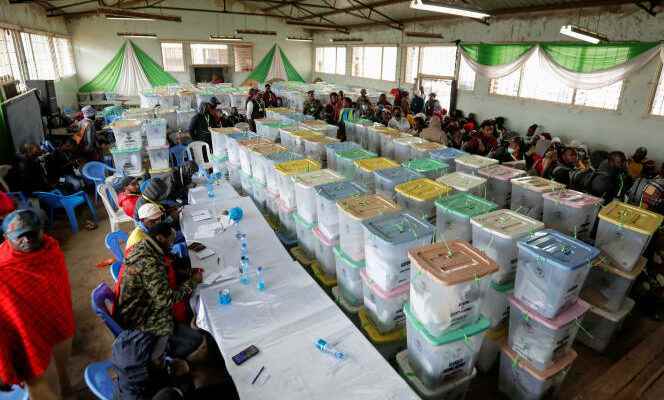To not miss any African news, subscribe to the newsletter of the World Africa from this link. Every Saturday at 6 a.m., find a week of news and debates covered by the editorial staff of the World Africa.
Kenyans have been waiting since Wednesday, August 10, for the results of the previous day’s general elections, marked by an increase in abstention, to find out who will emerge victorious from a duel that promises to be tight between veteran Raila Odinga and the vice-president outgoing William Ruto.
Amid disillusionment with the political class and soaring cost of living, around 65% of the 22.1 million voters turned out to vote for president, MPs and local elected officials, according to the Independent Electoral Commission (IEBC) . A sharp drop from the 78% turnout in the previous elections in 2017. “People did not come [voter] compared to the past because there have been false promises” for years, lamented to AFP Anthony Kemboi, a 24-year-old student living in Eldoret (west).
According to the first estimates of television, Raila Odinga, 77, historic leader of the opposition now supported by power, and William Ruto, 55, who is a challenger, are neck and neck. The other two candidates in the running should not get more than a few percent. If neither of the two favorites collects more than 50% of the vote, Kenya will experience a second round of the presidential election for the first time.
MM. Both Odinga and Ruto assured during the campaign that they would recognize the results. But the country feared Wednesday to be once again caught up in a post-election saga with which it is familiar, all the polls having been disputed since 2002 in this country considered as a democratic anchor point in East Africa.
The pressure is building
The presidential election of August 2017 had been invalidated by the courts for “irregularities”then rescheduled, tarnishing the reputation of the IEBC and prolonging a process marked by dozens of deaths in police repressions.
And, above all, in 2007-2008, the contestation of the results by Mr. Odinga had led to inter-community clashes which had left more than 1,100 dead.
On Wednesday evening, Amnesty International and several Kenyan civil society organizations expressed concern about “the increase in the number of false or misleading information” disseminated on social media.
Several messages from candidates and their supporters in the Odinga and Ruto camps had “intentionally sought to misinform the electorate and the public about the electoral process and election results”they said in a joint press release.
The pressure is therefore increasing on the Electoral Commission, which must declare the results by Tuesday 16 August at the latest. Its agents work hard to analyze the millions of ballots and dispel fears of rigging. “We are doing everything we can to get the process done as soon as possible”, said Wafula Chebukati, president of the IEBC, on Wednesday. The wait will last all the more since on Wednesday, a few Kenyans were still voting in two constituencies where polling stations were unable to open on time on Tuesday, due to technical problems in particular.
After the manual counting in the polling station, the results are transmitted electronically to the level of the constituency to be compiled, then to the national level to arrive at the final result. The minutes drawn up in each polling station must also be authenticated after having been transmitted in the form of a photo.
“It’s not a quick process”, commented from Eldoret Gabrielle Lynch, professor at the University of Warwick (Great Britain). The documents must be “processed, accounted for, cross-checked” in Nairobi, “it will take at least a few days”.
” No change “
An economic heavyweight of 50 million inhabitants, Kenya has been hard hit by the consequences of the pandemic, then the war in Ukraine and a record drought. The country is currently experiencing a spike in the cost of living.
The campaign promises of MM. Odinga and Ruto – two powerful and wealthy businessmen – focused on purchasing power and the fight against corruption, did not necessarily convince the population, about a third of whom live in poverty.
“I didn’t even vote because I don’t care, because it’s the same old people telling the same old stories and they don’t do anything for us”said Caroline Mwangi, 31, a waitress at a restaurant in Nairobi.
Both Odinga and Ruto have notably promised a brighter economic future for young people, the under 34s representing three quarters of the population but being particularly affected by unemployment.
In Kisumu, Eldoret, just like in the capital, life had not yet resumed its normal course, shops remained closed and the streets seemed partly asleep. The police presence was discreet.
